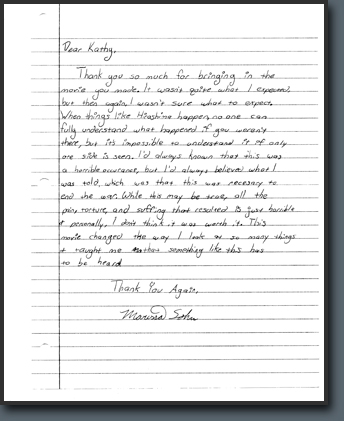
COMMENTS![]()
Witness to Hiroshima director, Kathy Sloane, presented an hour and a half workshop/screening with sixty-five high school sophomores at the Athenian School in Danville CA in February of 2009, and with 35 counseling students at San Francisco State University in March of 2009. She used the teacher’s guide materials on the meaning of “witness” and uses of story telling found on the film website www.witnesstohiroshima.com .The following is an edited selection from the students’ written comments.
| ATHENIAN SCHOOL | |
| “It was interesting that I could view the Pacific War from another perspective that I was not too familiar with. I am Korean and Koreans think that atomic bombs on Hiroshima and Nagasaki were necessary to end the colonialism and atrocity of Japan over the Asian continent. But after listening to what the bomb survivors and victims had to go through, I realized that atomic bombs may not have been an absolute resolution to finish the war…. Generally I liked how you talked about witnessing…Thank you.” |
|
Justin Yoo |
|
| “When things like Hiroshima happen, no one can fully understand what happened if you weren’t there, but it’s impossible to understand it if only one side is seen. I’d always known that this was a horrible occurrence, but I’d always believed what I was told, which was that this was necessary to end the war. While this may be true, all the pain, torture and suffering that resulted is just horrible, and personally, I don’t think it was worth it. This movie changed the way I look at so many things and taught me that something like this has to be heard. Thank you.” |
|
| Marissa Sohn | |
| “I really enjoyed your presentation before you showed the film. The “witness talk” really challenged my definition of a witness and what a huge responsibility it is to witness something in history…Thank you again for showing me a more personal side of history.” |
|
| Courtney | |
| “When I heard what the movie we were watching was about, I thought great, another movie about political issues and war. But it completely blew me off how deep-felt and personal it was…I have to thank you for sharing that with us. I love how the movie is not about Hiroshima itself, but about how it affected a man and changed his life forever.” | |
| Domenica Lecca | |
| SAN FRANCISCO STATE UNIVERSITY | |
| "Throughout my education I was never shown the Japanese people’s perspective. This movie showed me that…this movie touched my heart because it made me much more open-minded.” | |
| Dawn Brew | |
| “This film brings to mind the culturally varied ways people deal with healing. The viewer is able to see the experience through Mr. Tsuchiya’s eyes, challenging the ways our backgrounds have presented history to us.” | |
| Jessy Jones | |
| “Kathy Sloane’s film Witness to Hiroshima…opened my eyes to other cultures and the struggles that they have been through. In that USA and Japanese war, there was little thought from the USA end about how much healing would have to take place in Japan. I think everyone should take the short amount of time to sit down, focus, and watch this film because it is crucial in understanding different aspects of the long process of healing.” | |
| Lisa Myers | |
| “Witness to Hiroshima provides personal experiences and a perspective that I had not really ever heard or considered before. In school we definitely learned about the atomic bombing in Nagasaki and Hiroshima. However reading about it in textbooks can only bring so much perspective to it. The personal experience in the film... made me feel more of a connection to it.” | |
| Kimberly Ng | |
| “This film really related to a human experience, very un-text book, which really impacted the way I took in the information. Understanding history as a personal story really changes the way I look at history. I thought this film was incredible and new; it should be shown in high schools and colleges, hitting a note that if very often forgotten in history classes: the personal and the emotional.” | |
| Lisa Dapron | |
| “I found it interesting that watercolor was the medium used by Mr. Keiji Tsuchiya, since water seemed to be the substance that took life and sustains life.” | |
| Lucy Orantes | |
| “I was very happy to see that someone in this world wanted to learn about the other side of the story. The story of what life was like for the Japanese after the war. In the United States is has been my experience that not many people question what occurred in any of our wars…While we may sit here and count our casualties, what impact did we leave on the people we were fighting with, what were their numbers of wounded or dead? I felt that the film finally gave the United States the chance to be the villain in the war, not the Japanese.” | |
| Pantea Rad | |
| “I think that this film would be a great addition to middle and high school classrooms. Compassion is not regularly taught in public schools, although there is no reason why it should not be. A different awareness to European perspectives on history would benefit all students.” | |
| Polina Shamariyeva | |


